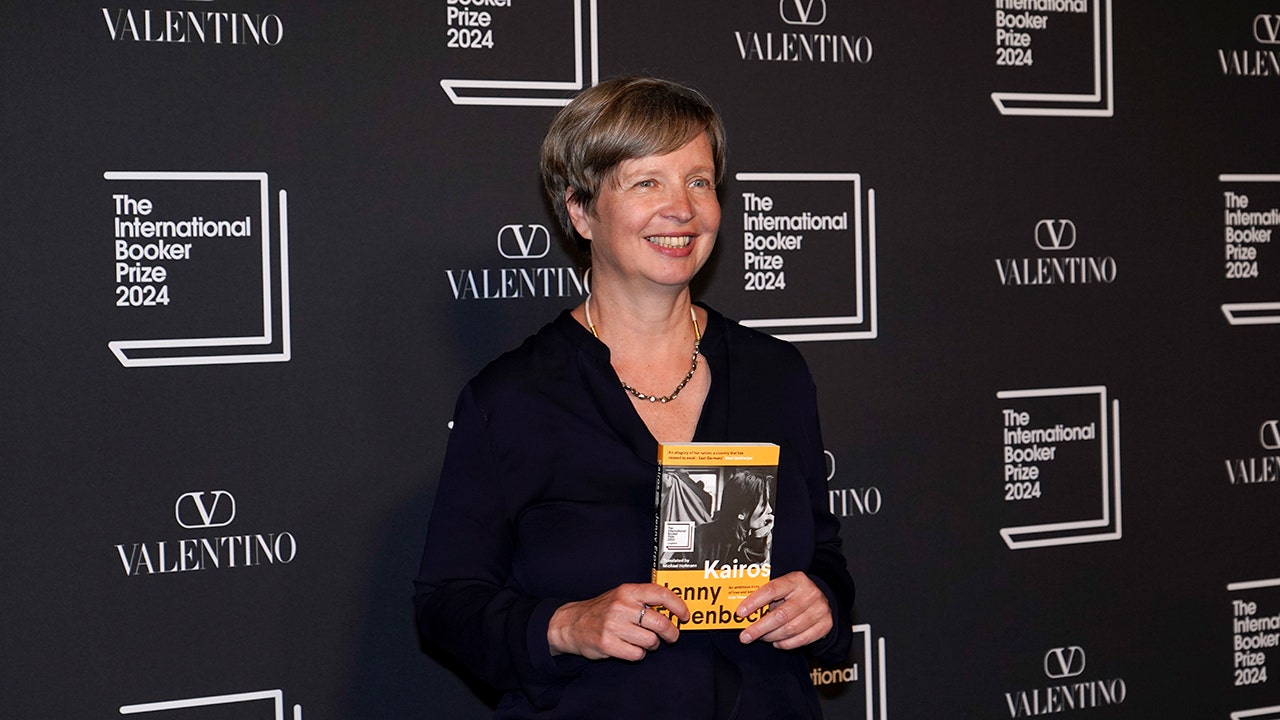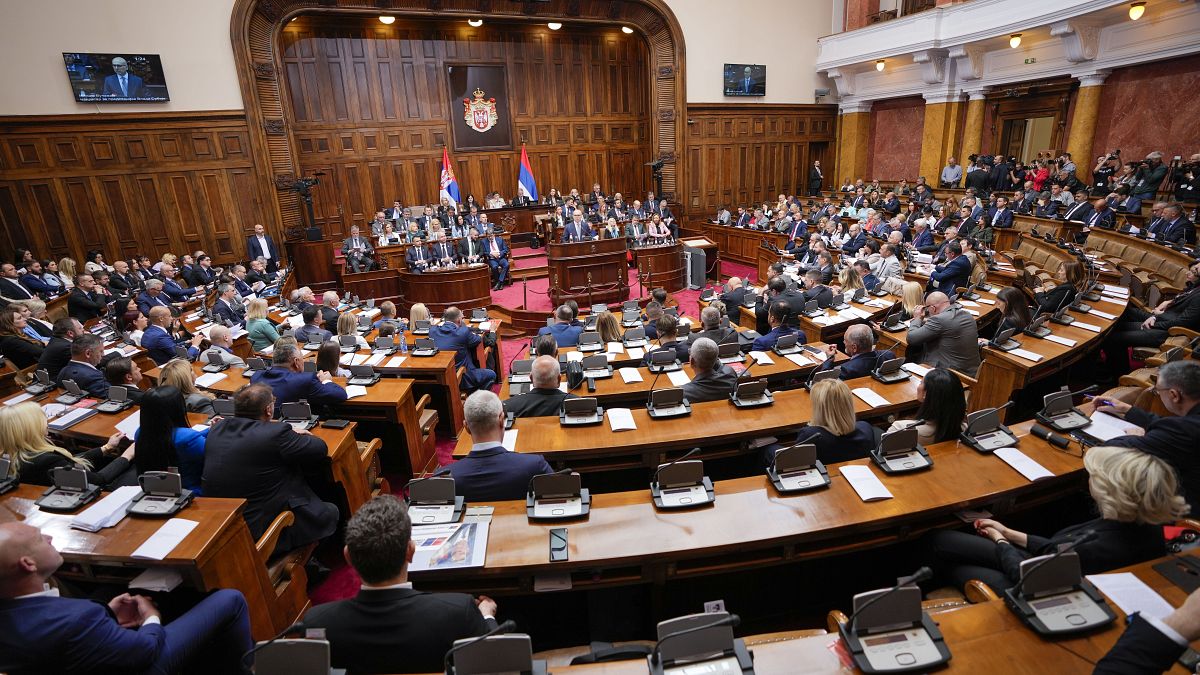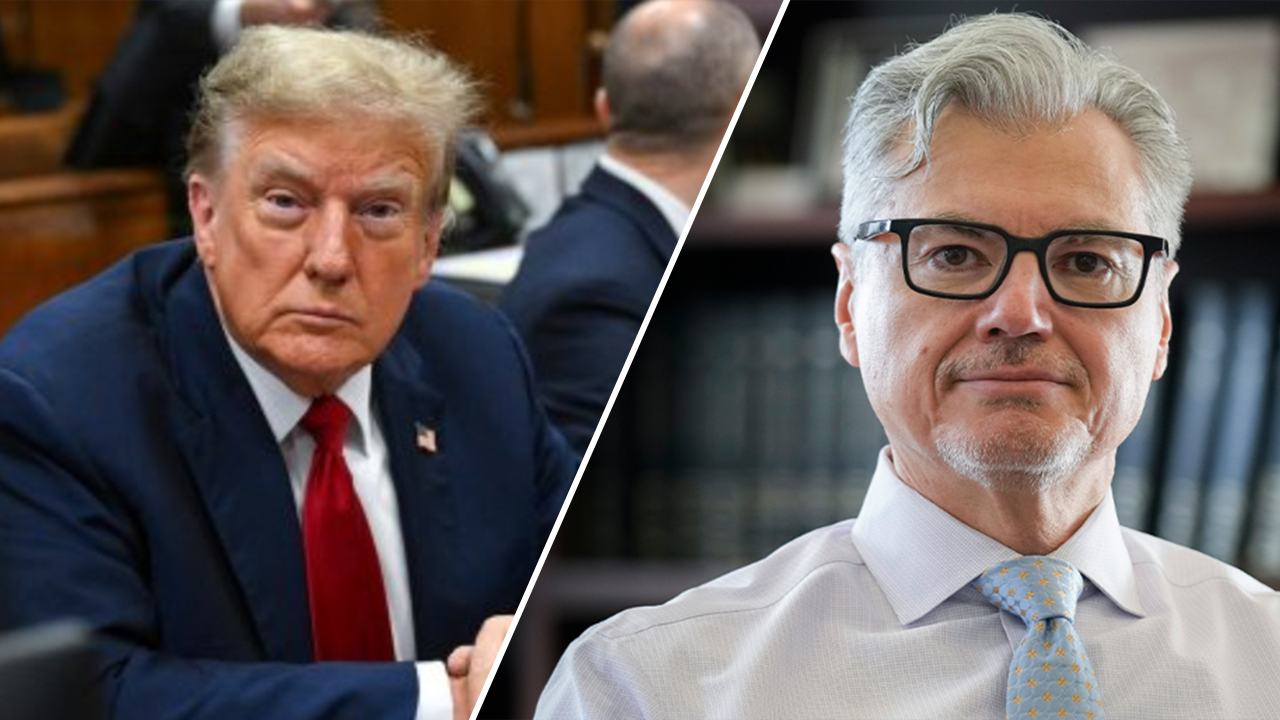World
Russia turmoil to fuel market volatility, flight to safety
/cloudfront-us-east-2.images.arcpublishing.com/reuters/SQW52P5MWFMD5E5ZYMKEL6MRNY.jpg)
[1/5]Fighters of Wagner private mercenary group stand on a tank outside a local circus near the headquarters of the Southern Military District in the city of Rostov-on-Don, Russia, June 24, 2023. REUTERS/Stringer
June 24 (Reuters) – Mutinous Russian mercenary fighters barrelled towards Moscow on Saturday after seizing a southern city overnight, with Russia’s military firing on them from the air but seemingly incapable of slowing their lightning advance.
Here are reactions from investors and analysts to the news:
STEVE SOSNICK, CHIEF STRATEGIST AT INTERACTIVE BROKERS:
“This is a truly exogenous event that leads to initial shock and a flight to safety. It should awaken VIX from its stupor. First move is likely to be a bump in government bond prices (lower yields) and USD. Riskier assets tend to decline. The question is how much and how lasting the reaction will be, much of which depends upon unknowable developments.”
“Even with Russian embargoes, they still sell plenty of raw materials to sympathetic nations like China and matter to the global supply. It is reasonable to expect oil and other key commodity prices to rise. If oil prices rise sharply, that will indeed weigh upon equities and reignite stagflation fears. Gold is tough to read. In theory it should benefit from a flight to safety, but in practice a strong dollar can impede it.”
“U.S. treasuries should rise on the safety trade.”
“With Russia largely disconnected from the global economy, few U.S. or European companies will have direct impacts from instability in a country that’s already a pariah. So the broader markets will take their cues from bonds and commodities. Defense-related stocks should catch a bid – the world is not a safer place today – and commodity-linked stocks should also be outperformers for the reasons stated above.”
MICHAEL PURVES, CEO AT TALLBACKEN CAPITAL ADVISORS:
“Certain parts of the stock market have been flying really high, we do know that’s largely been driven by P/E expansion rather than earnings and this might give people an excuse to sell.”
“These types of geopolitical shocks are often short lived and usually don’t have much impact on the U.S. stock market but this time it may because stocks have run up so high.”
“Any time you have these kinds of political disturbances in a commodity nation you at least expect a short term shock to the prices of the commodities produced there.”
“We should start seeing classic risk off dynamics on Sunday night such as global equity futures lower, crude oil higher, treasury prices higher.”
DAVID KOTOK, CHIEF INVESTMENT OFFICER AT CUMBERLAND ADVISORS IN SARASOTA, FLORIDA:
“This is a potential civil war in Russia. Important implications as Putin is already weakened by events and now faces existential threat as does his antagonist.”
“Turmoil effects include the price and availability of Russian energy. Geopolitical impact on Russian alliances like Belarus and nearby countries in Soviet sphere. In EU what does Hungary (Orban) or NATO ally Turkey do.
“Regardless of the outcome, this is already a very big deal.
“Initial market reaction will be driven by news reports and by any concrete events. That is usually true of most rapidly changing event sequences. The strategic damage is already done. Every capital in the Russian alliance of countries and in the adversaries’ alliance and in the neutral alliance is rethinking the relationship with Putin.”
GEORGE BOUBOURAS, HEAD OF RESEARCH AT K2 ASSET MANAGEMENT IN MELBOURNE:
“Current reported Russian events are not helpful. It’s very concerning for the complex geopolitical global landscape and any uncertainty will obviously impact markets.”
“Higher vol lies ahead. However fundamentals will eventually resurface. That is, economies in developed markets remain resilient & central banks concerns’ with stubborn inflation creates many challenges as rates need to go higher & remain higher for longer.”
JAMIE HALSE, WHO MANAGES AN A$500 BILLION JAPAN-FOCUSED FUND AT PLATINUM ASSET MANAGEMENT IN SYDNEY: “If Putin removed, pure speculation and a hypothetical on my part, troops withdrawn from Ukraine and peace deal agreed, then that would be bullish for Russian-exposed businesses, Eastern Europe stocks, probably Chinese stocks by implication. Bearish energy, resources and defense stocks. “Probably bearish Indian stocks too as the dividend they’ve received from cheap Russian oil likely disappears. “On the other hand, civil war, especially if prolonged, in a major nuclear armed nation should make anyone uncomfortable…(though) we don’t really know what’s going on at this point. Civil war may be too long a bow to draw.”
Reporting by Tom Westbrook in Singapore, Megan Davies, Carolina Mandl and Ira Iosebashvili in New York; Writing by Lananh Nguyen; Editing by Daniel Wallis
Our Standards: The Thomson Reuters Trust Principles.

World
Video: Israel Confiscates A.P.’s Camera Equipment, Shuts Down Live Feed

new video loaded: Israel Confiscates A.P.’s Camera Equipment, Shuts Down Live Feed
transcript
transcript
Israel Confiscates A.P.’s Camera Equipment, Shuts Down Live Feed
Israeli officials claimed The Associated Press had violated a new broadcasting law by providing images of northern Gaza to Al Jazeera, the pan-Arab broadcaster that the government voted to shut down.
-
Good luck. [microphone disconnects]
Recent episodes in Israel-Hamas War
World
German author Jenny Erpenbeck wins International Booker Prize for tale of tangled love affair

German author Jenny Erpenbeck and translator Michael Hofmann won the International Booker Prize for fiction on Tuesday for “Kairos,” the story of a tangled love affair during the final years of East Germany’s existence.
The novel beat five other finalists, chosen from 149 submitted novels, for the prize, which recognizes fiction from around the world that has been translated into English and published in the U.K. or Ireland. The 50,000 pounds ($64,000) in prize money is divided between author and translator.
COURT FINES GERMAN-TURKISH AUTHOR OVER ‘DEATH CAMP’ SPEECH
Canadian broadcaster Eleanor Wachtel, who chaired the five-member judging panel, said Erpenbeck’s novel about the relationship between a student and an older writer is “a richly textured evocation of a tormented love affair, the entanglement of personal and national transformations.”
Jenny Erpenbeck, author of Kairos, poses ahead of the International Booker Prize, in London, Tuesday, May 21, 2024. (AP Photo/Alberto Pezzali)
It’s set in the dying days of the German Democratic Republic, leading up to the fall of the Berlin Wall. Erpenbeck, 57, was born and raised in East Berlin, which was part of East Germany until the country disappeared with German reunification in 1990.
“Like the GDR, (the book) starts with optimism and trust, then unravels so badly,” Wachtel said.
She said Hofmann’s translation captures the “eloquence and eccentricities” of Erpenbeck’s prose.
The International Booker Prize is awarded every year. It is run alongside the Booker Prize for English-language fiction, which will be handed out in the fall.
Last year’s winner was another novel about communism and its legacy in Europe, “Time Shelter” by Bulgarian writer Georgi Gospodinov and translated by Angela Rodel.
The prize was set up to boost the profile of fiction in other languages — which accounts for only a small share of books published in Britain — and to salute the underappreciated work of literary translators.
Hoffman is the first male translator to win the International Booker Prize since it launched in its current form in 2016.
World
Serbian parliamentary minnow pushes for 'Russian law' equivalent

The proposed anti-foreign NGO law could bring more attention to the left-wing nationalist Movement of Socialists party, which currently has just two MPs in the 250-seat National Assembly.
Serbia’s Movement of Socialists party has announced it will draft a bill aiming to restrict the activities of foreign non-governmental organisations operating in the Balkan country.
The draft closely resembles the highly controversial law on foreign agents that is expected to be implemented in Georgia soon.
Defending the draft law, Movement of Socialists MP Bojan Torbica said, “Betraying one’s own country and people can no longer be a highly profitable activity.”
The proposed anti-foreign NGO law could bring more attention to the left-wing nationalist party, which currently has just two MPs in the 250-seat National Assembly.
“I really believe that it is a threat to the Republic of Serbia if there are NGOs that are donated from abroad and work here to propagate Kosovo as an independent state, to propagate the genocide in Srebrenica and the destruction of Republika Srpska,” said Đorđe Komlenski, parliamentary leader of the Movement of Socialists.
The three issues — two of which pertain to neighbouring Bosnia and Herzegovina — have been prominent talking points of nationalist politicians in Serbia ever since the disintegration of the former Yugoslavia and a series of bloody wars in the region in the 1990s.
While it is unclear whether Komlenski and Torbica alone can gather enough support to advance the law past the draft stage, civil society actors, such as the Youth Initiative for Human Rights, are concerned that the bill will impact Serbian society’s future.
Marko Milosavljević from Youth Initiative for Human Rights sees the move as a means of intimidating civil society and independent media.
“Through these announcements, we actually see the ban on the advocacy of certain democratic principles is kind of desireable,” Milosavljević said.
Serbian voters will go to the polls on 2 June to participate in a rerun of last year’s local election in 66 electoral units, including the capital, Belgrade.
The EU recently criticised Serbia, a candidate for EU membership, for not conducting free and fair elections, citing allegations of voter fraud.
-

 News1 week ago
News1 week agoSkeletal remains found almost 40 years ago identified as woman who disappeared in 1968
-

 World1 week ago
World1 week agoIndia Lok Sabha election 2024 Phase 4: Who votes and what’s at stake?
-

 World1 week ago
World1 week agoUkraine’s military chief admits ‘difficult situation’ in Kharkiv region
-

 Movie Reviews1 week ago
Movie Reviews1 week agoAavesham Movie Review
-

 Movie Reviews1 week ago
Movie Reviews1 week agoUnfrosted Movie Review: A sweet origins film which borders on the saccharine
-

 World1 week ago
World1 week agoCatalans vote in crucial regional election for the separatist movement
-

 Politics1 week ago
Politics1 week agoNorth Dakota gov, former presidential candidate Doug Burgum front and center at Trump New Jersey rally
-

 Education1 week ago
Education1 week agoVideo: Protesters Scuffle With Police During Pomona College Commencement



















